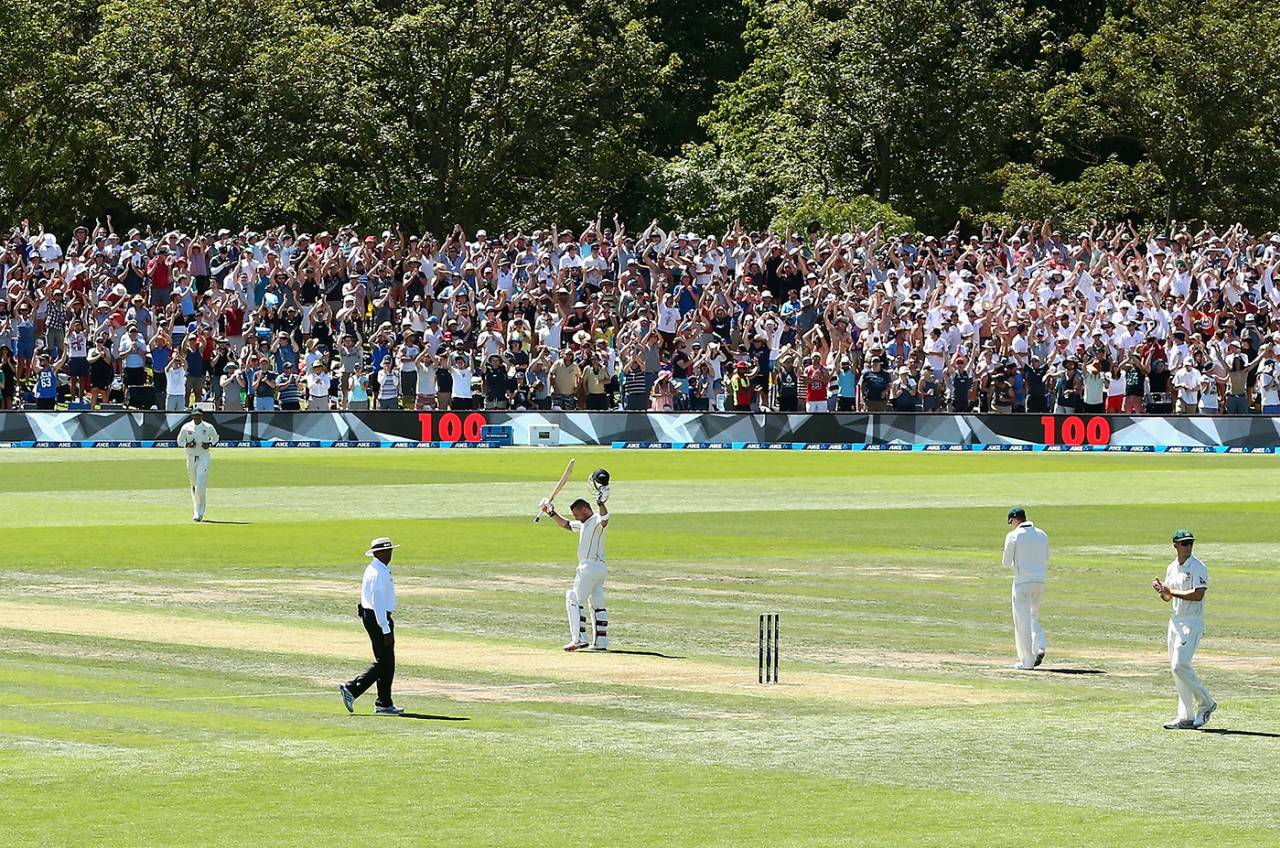"Great men die twice," Norman Mailer wrote of Muhammad Ali, "once as great and again as men." It's not just great sportsmen who face two ends either. All sporting careers finish, and few with the fairy-tale, gunslinger's ride off into the sunset that
Brendon McCullum has earned so magnificently with his record-breaking century.
Most players have probably sensed the onset of the end in the dulling of once-fine motor skills, even if they're not being shown towards the exit by the injury that no longer responds to treatment or the contract offer that does not come. The End is no respecter of achievement or reputation, and its message can be delivered brutally. In what turned out to be his penultimate Test, Ricky Ponting, Australia's second-greatest batsman, was
left on his hands and knees in the dust by a Jacques Kallis yorker, an indignity that proved the tipping point. Kevin Pietersen was called into
a meeting with a former captain a couple of hours after he had scored 355 not out
at The Oval for Surrey and informed it was all over for him (again).
And here is
Geoffrey Boycott on the end of his final day as a professional cricketer, which came not at Headingley but
at Scarborough, in a game in which the lateness of Northamptonshire's declaration denied him a final innings:
"Something had come to an end, something wonderful. I just thought, this is it then. I waited for the ground to clear. Then I wandered around on my own, among all the newspapers and food wrappers and tin cans." The maker of 151 first-class centuries left alone amid the litter of an ordinary day, extraordinary only for him.
Age came for Geoffrey. Others have been overwhelmed by stress, discontent, boredom, ennui. Andrew Flintoff and Steve Harmison, two men who had been through the mill physically and emotionally, got their golden farewell on a sunlit Oval, with the Ashes in hand. Graeme Swann, so key to that team and the successes soon to come, would go out mid-Ashes tour, his elbow destroyed by the day job. Jonathan Trott, who made a crucial hundred on debut (another kind of fairy tale), could not battle back from his stress-related illness. There is no equivalency, no fairness to the end and the way it comes, just the inevitable knowledge that it surely will.
In his foreword to a later edition of David Frith's book on cricket's suicides, Silence Of The Heart, Mike Brearley writes: "This book forces me to work through an idea that I have long held: that cricket more than any other sport helps a person work through the experience of loss by virtue of forcing its participants to come to terms with symbolic deaths on a daily basis…"
McCullum's mind was set on this course for years, and he has dragged the rest of cricket with him. Perhaps his blissful blast was confirmation that risk sometimes equals the greatest of reward
It's true that cricketers face that end almost every time they play. A stat I read somewhere said that batsmen fail to make their average in two out of every three innings. Even if that seems slightly high, it points to the odds of a final glorious fling being against them.
All of which makes McCullum's exit even more remarkable. It is a modern trend to announce publicly a retirement date. I like it. I think it befits well-loved players to receive the appreciation of the public and fellow pros (although the guard of honour seems to have become a kind of tactic - make the recipient feel warm and fuzzy and emotional enough that they're almost bound to fail). But it also sets up the narrative to a degree that fulfilling it must seem daunting. McCullum seemed to be feeling it: his scores since Christmas ran 0, 44, 28, 47, 0 and 10. Every occasion brought a "last" of some sort: last game here or there, last ODI series, last ODI, last Test series, last Test match, last time you'll see this umpire or face that bowler…
At the Basin he rolled the dice and failed. At Hagley Oval, was he lucky, that the game decided to grant him that epic, unforgettable sign-off on a blue sky day at the loveliest of grounds? Well, he was caught off a no-ball and smeared so many over the slips that Steve Smith set a long stop, so by that simplistic measure, maybe. But McCullum's mind was set on this course for years, and he has dragged the rest of cricket with him. So perhaps his blissful blast was manna from heaven, confirmation that risk sometimes equals the greatest of reward.
His is an ending we will remember. Do you recall Muhammad Ali's? Probably not, unless you are a boxing enthusiast. It came in the "Drama in Bahama", where he lost in harrowing circumstances to the late Trevor Berbick in a fight that was one of several too many. Fortunately, as with Ponting and Boycott and most of our beloved players, once the stage has cleared and the circumstances of their departure has receded, we recall them best in their pomp. McCullum has that and more. He goes with the best words of all ringing in his ears: "Why is he retiring now?"
Jon Hotten blogs here. @theoldbatsman
